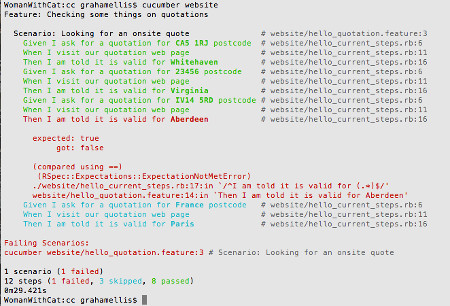
|
Training, Open Source Programming Languages |
| Home | Accessibility | Courses | The Mouth | Resources | Site Map | About Us | Contact |
| For 2023 (and 2024 ...) - we are now fully retired from IT training. We have made many, many friends over 25 years of teaching about Python, Tcl, Perl, PHP, Lua, Java, C and C++ - and MySQL, Linux and Solaris/SunOS too. Our training notes are now very much out of date, but due to upward compatability most of our examples remain operational and even relevant ad you are welcome to make us if them "as seen" and at your own risk. Lisa and I (Graham) now live in what was our training centre in Melksham - happy to meet with former delegates here - but do check ahead before coming round. We are far from inactive - rather, enjoying the times that we are retired but still healthy enough in mind and body to be active! I am also active in many other area and still look after a lot of web sites - you can find an index ((here)) |
|
Defining the behaviour of your web site and testing that it works
This example uses ... Capybara, Cumumber, Gherkin, RSpec, Selenium and Ruby ... yes, you'll need an explanation later on of what all of these are! Have you ever updates something on a website, only to find that it the process you've broken something else? I've been teaching Behaviour Driven Development of web sites in Ruby this week - well not strictly "Behaviour driven nor developemnt" because the objective of my customer is to describe the required behaviour of an existing website in a codified way, and then be able to check that it behaves as it's suppose to. Not only behaving as it's supposed to today, but also into the future as the web site is enhanced. How does this work? 1. I define my behaviour using the Gherkin language - here's a definition of some behaviours I would like to see from the website I'm working on: Feature: Checking some things on quotations2. I run that through cucumber and it tells me where my tests are missing WomanWithCat:cc grahamellis$ cucumber website3. I copy and paste the suggested code template into a step definition file, and complete the tests: require 'selenium-webdriver'4. I then run my "cucumber" again to see if it works. Now that I have steps defined, the selenium drivers I have in my source are going to act as a puppeteer to control Firefox - and thus the website is tested. Here's a sample output:  Reading that output (from an extended version wit four rather than two sets of data), I can see that four tests have passed and one has - intentionally - failed. Testing does require that - from time to time - you make things go wrong to check that it's really doing the noral tests correctly! Gherkin source code - [here] Ruby steps using Selenium - [here] Alternative steps using Watir - [here] (written 2015-05-30) Associated topics are indexed as below, or enter http://melksh.am/nnnn for individual articles R222 - Ruby - Cucumber / web site testing with watir webdrivers and capybara[3426] Automed web site testing scripted in Ruby using watir-webdriver - (2011-09-09) [4387] Regression Testing my website - Cucumber and Watir - (2015-01-07) [4389] Cucumber example - test::unit, scenario outlines, datafile driven test - (2015-01-09)
Some other Articles
Regular Expressions for the petrified - in RubyWhere does Ruby load modules from, and how to load from current directory Separating your code for easier testing, understanding and re-use; example in Ruby Reading and parsing a JSON object in Ruby Defining the behaviour of your web site and testing that it works The TransWilts Community Intergrated Transport Corridor Significant work - beyond helloworld in Ruby Ruby - where one statement ends and the next begins Around the world from Melksham Sunday train times - 17th May to 6th September 2015 |
4759 posts, page by page
Link to page ... 1, 2, 3, 4, 5, 6, 7, 8, 9, 10, 11, 12, 13, 14, 15, 16, 17, 18, 19, 20, 21, 22, 23, 24, 25, 26, 27, 28, 29, 30, 31, 32, 33, 34, 35, 36, 37, 38, 39, 40, 41, 42, 43, 44, 45, 46, 47, 48, 49, 50, 51, 52, 53, 54, 55, 56, 57, 58, 59, 60, 61, 62, 63, 64, 65, 66, 67, 68, 69, 70, 71, 72, 73, 74, 75, 76, 77, 78, 79, 80, 81, 82, 83, 84, 85, 86, 87, 88, 89, 90, 91, 92, 93, 94, 95, 96 at 50 posts per pageThis is a page archived from The Horse's Mouth at http://www.wellho.net/horse/ - the diary and writings of Graham Ellis. Every attempt was made to provide current information at the time the page was written, but things do move forward in our business - new software releases, price changes, new techniques. Please check back via our main site for current courses, prices, versions, etc - any mention of a price in "The Horse's Mouth" cannot be taken as an offer to supply at that price.
Link to Ezine home page (for reading).
Link to Blogging home page (to add comments).
PH: 01144 1225 708225 • EMAIL: info@wellho.net • WEB: http://www.wellho.net • SKYPE: wellho
PAGE: http://www.wellho.net/mouth/4501_Def ... works.html • PAGE BUILT: Sun Oct 11 16:07:41 2020 • BUILD SYSTEM: JelliaJamb